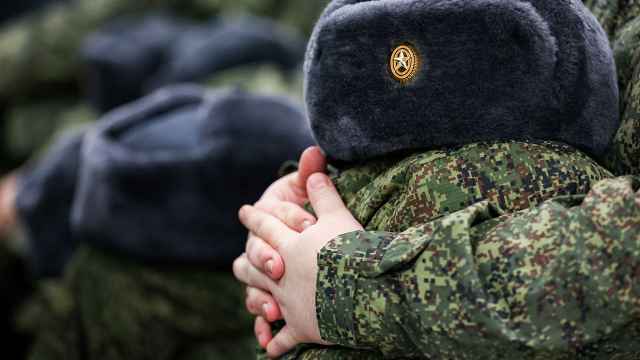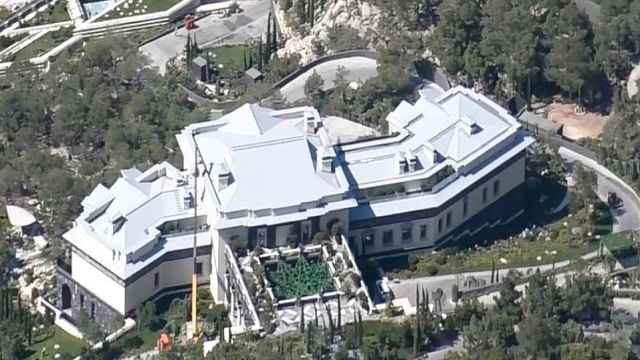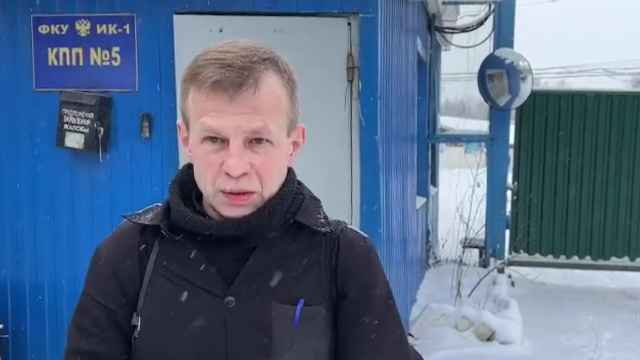VALUIKI, Belgorod region — Russia has increased its military activity near the border with Ukraine markedly since late last week, a reporting team said after making return visits to the frontier zone where NATO says Moscow has amassed 40,000 troops.
Russia's military moved equipment and weaponry around the border area on Wednesday but there was no clear evidence that they were preparing either to pull back or advance.
Russia has put thousands of troops near the border for what Moscow says are routine exercises but which NATO said is an attempt to intimidate Ukraine's Western-backed government by holding out the threat of an incursion.
U.S. President Barack Obama on Monday called on President Vladimir Putin to pull back the forces, saying diplomatic efforts to end the crisis in Ukraine "cannot succeed in an environment of Russian military intimidation on Ukraine's border."
A Reuters team went independently to three locations where Russian units are temporarily deployed, first visiting at the end of last week and again on Wednesday.
On the second visit on Wednesday there was a marked increase in activity, with more military trucks on the roads in the area, and more service personnel in evidence at the deployment sites.
At one location, in open country near the village of Valuiki, in the Belgorod region about 20 kilometers from the Russian-Ukrainian border, a squadron of Mi-24 attack helicopters that was there on Friday had flown away. Local people said the helicopters left on Monday evening.
But at the same site new forces had arrived. Reporters saw 10 large Army tents and 20 trucks, significantly more than last week. The trucks had their hoods up and soldiers were inspecting the engines.
The site was surrounded with a barbed wire fence that was not there last week.
The intervening days have seen a sharp increase in tensions across the border in Ukraine, where armed pro-Russian militants have seized buildings in about 10 towns and cities. The Kiev government has launched an "anti-terrorism" operation to retake captured towns, which Russia says could lead to civil war.
Moscow claims the right to intervene militarily in Ukraine to protect Russian speakers, although it says it has no plans to do so.
Flown Away
U.S. Air Force General Philip Breedlove, NATO's Supreme Allied Commander in Europe, said Wednesday that there was no significant change in the size or position of the Russian forces close to the border.
A Russian Defense Ministry spokesman did not answer a telephone call seeking comment on Wednesday.
At a second makeshift helicopter base, near the village of Severny about 170 kilometers to the northwest of the first site, the 16 helicopters that were there on Friday had also gone. There did not appear to be any other change.
That base is about 90 kilometers from Kharkiv, Ukraine's second-largest city.
A nearby field hospital unit that had set up in fields outside the village of Dalnaya Igumenka looked unchanged since last week, with about 10 tents, 15 military trucks, and a mobile radar installation.
Approaching the border, on the main road between the cities of Voronezh and Belgorod, reporters saw a column of three dark-green military trucks. More military trucks were spotted on roads near the border, traveling individually.
The bustle was in contrast to the more laid-back attitude of Russian forces last week. In Dalnaya Igumenka, a major took time out to buy an ice cream from a local store.
"We were brought here three weeks ago and they promised to send us back after a week," said the major, with the ice cream in his hands. He declined to give his name, saying he was not permitted to talk to journalists.
Several residents in Valuiki said the military presence in their neighborhood was the biggest since World War II, when the village was briefly occupied by Nazi forces.
"It feels like 1941," Tatyana, a 37-year-old shop worker, said last week, as a helicopter buzzed overhead. "There are a lot of military in the town and at the airfield, very many of them," she said.
People in the area know eastern Ukraine well because they have family ties with people there and often travel across the border to shop in Kharkiv.
Many residents said eastern Ukraine was historically Russian and belonged within Russia. But one woman, 43-year-old Rimma Zhigunova, expressed misgivings.
"Why would you send troops to Kharkiv?" she asked. "If Kharkiv asks to join [Russia], it is going to be war."
A Message from The Moscow Times:
Dear readers,
We are facing unprecedented challenges. Russia's Prosecutor General's Office has designated The Moscow Times as an "undesirable" organization, criminalizing our work and putting our staff at risk of prosecution. This follows our earlier unjust labeling as a "foreign agent."
These actions are direct attempts to silence independent journalism in Russia. The authorities claim our work "discredits the decisions of the Russian leadership." We see things differently: we strive to provide accurate, unbiased reporting on Russia.
We, the journalists of The Moscow Times, refuse to be silenced. But to continue our work, we need your help.
Your support, no matter how small, makes a world of difference. If you can, please support us monthly starting from just $2. It's quick to set up, and every contribution makes a significant impact.
By supporting The Moscow Times, you're defending open, independent journalism in the face of repression. Thank you for standing with us.
Remind me later.






